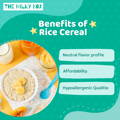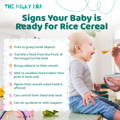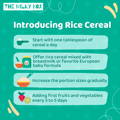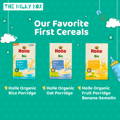Yes. After introducing it as a single food, you can puree some fruit to go along with it or offer just a couple of teaspoons and any source of protein familiar to your infant. The idea is to create a plate that’s varied rich in multiple nutrients and delicious to their taste.
Is Rice Cereal Safe for Babies?
By: Dr Maria Cerino - Updated May 15, 2024 - 10 Minute Read

If you’re at the brink of a brand-new stage with your baby, it’s normal to try and soak up all the information. It’s part of being a good parent. However, when it comes to starting solids, there are many different styles of feeding. Some people swear by natural food only, others love the Baby-Led Weaning Route, and busy parents swerve towards pre-prepared foods.
Rice cereal has been around since the thirties. However, there is a growing concern regarding the safety of rice cereal for babies.
In this article, we aim to clarify the issue and provide more information on the topic.
Table of Contents:
1. When Do Babies Start Eating Cereal?
2. What Is Rice Cereal?
3. When Can I Give My Baby Rice Cereal?
4. Why Don't They Recommend Rice Cereal For Babies?
5. How Much Rice Cereal Can I Give My 6-Month-Old?
6. Can Rice Cereal Upset A Baby's Stomach?
7. Let’s Talk About Rice Cereal Alternatives
When Do Babies Start Eating Cereal?
Babies can start eating cereal around six months old. This is a consensus among pediatricians, and it’s incredibly important to follow this rule. Starting solids before this age can cause serious health issues such as food allergies, bowel inflammation, constipation, and more.
Cereal is a perfect way to introduce solids, as it’s presented as an easy-to-ingest puree with a neutral flavor profile. It doesn’t require additives and can get your baby into the motion of chewing easily after just a few feeds.
Nowadays, there are hundreds of options in the market, but one of the first industrialized foods to be introduced to babies was rice cereal.
What Is Rice Cereal?
Rice cereal is a single grain processed cereal made to introduce solids to babies. It’s been popular for decades thanks to its neutral flavor profile, affordability, and hypoallergenic qualities. Unlike many wheat cereals, it’s an easy way to introduce solids to your baby.
Usually, it comes in flakes, made to be reconstituted with breast milk or other alternatives. It creates a pudding-like consistency that, when mixed correctly, contains no lumps, and has a very neutral, mild flavor. It’s also specifically enriched with nutrients all babies need: iron, folic acid, and multiple vitamins.

When Can I Give My Baby Rice Cereal?
Cereals can be started on babies right as soon as it’s time to start solids, at or after six months of age. Because of their easy-to-digest nature, they’re one of the first foods you can introduce your newborn to, with a high success rate. Along with oatmeal, they provide much-needed carbs and are easy to digest and chew, making them a hit among younger infants.
Introducing solid foods to infants can be challenging, but rice cereal, along with fruits and vegetables, is one of the few foods that can be started right away. To begin with, it’s recommended to introduce it slowly, combined with breast milk or formula, and watch for signs of readiness. The formula quality is crucial when choosing to make a meal out of this combination, as it can supplement it and provide the perfect nutrition.
However, it is recommended to try a few different cereals made with varied sources of grains such as wheat, barley, or quinoa to introduce them to variety from an early age. It’s essential to keep in mind that wheat is often an allergy causing food, so you need to talk to your pediatrician first before introducing it to prepare in case your baby shows signs of an allergic reaction.

Why Don't They Recommend Rice Cereal for Babies?
A couple of years back, rice cereal became a big source of concern for parents, as Consumer Reports tested arsenic contents in rice, and they were found to be close to the acceptable limit. Let’s dive deep into arsenic and why it’s in our rice.
Arsenic is a naturally occurring heavy metal found in soil and the environment. Many foods have trace amounts of Arsenic: contaminated well water, processed fruit juices such as grape and apple, and processed rice cereal.
As it’s found in the soil, the rice plant naturally absorbs arsenic. However, it accumulates in higher concentrations due to rice’s absorbing qualities. Both adults and infants are exposed to arsenic when eating rice, but it’s a more significant concern for babies, particularly during their first year of life, when most of the brain development occurs.
American Rice Cereal Brands
The FDA deemed one hundred parts per billion of inorganic arsenic in infant rice cereal appropriate. Their testing found that most infant rice cereals on the market meet, or are close to, the proposed level.
The name brands that caused a more significant outcry were American Companies: Earth’s Best Rice Cereal, with 152 ppb and 106.8 ppb for regular Gerber Rice Cereal and 68.4 ppb for Gerber’s Organic Cereal. For this reason, many companies started shifting away from fully endorsing rice cereal and sought ways to diminish the arsenic content, such as changing the type of rice used in their products.
Nowadays, most commercial rice cereals are below the recommended parts per billion and, therefore, safe to consume.
European Rice Cereal Brands
The European Commission (EC) has taken steps to address concerns about the levels of inorganic arsenic in infant rice-based foods. To protect infants, the EC has set stricter standards. This law came into effect in 2016.
Legislation has specific provisions regarding the use of food additives, presence of contaminants in products, and use of materials that come into contact with food. These provisions also apply to unwanted levels of toxins.
US vs EU Cereal Brands
As you search for a safe and organic rice cereal, we recommend European brands that adhere to strict infant regulations and limit harmful toxins.
How Much Rice Cereal Can I Give My 6-Month-Old?
The answer to the question of when to introduce rice cereal to a baby's diet can vary depending on factors such as the child's age and the overall variety of their diet. Rice cereal can be consumed up to three times per week, always complemented with fruits or other nutritious foods, but never with synthetic added sweeteners or colorings.
When introducing rice cereal to six-month-old babies, it is recommended to start with one tablespoon of cereal and to increase the portion sizes gradually as they grow and adjust. It's essential to let the baby taste it on their own accord, never forcing them to ingest more than they want to.
During the first feedings, it's best to offer rice cereal plain, mixed with breastmilk or your little one’s favorite European baby formula. This ensures your infant can try it out independently and get used to the new texture. Once they've become familiar with it, pureed apples or bananas are a wonderful way to introduce other micronutrients into the mix.
As your little one gets older applesauce, peaches, bananas, apricots, pears, avocado and berries are appropriate for mixing into rice cereal. The first vegetable mix-ins include sweet potatoes, squash, pumpkin, potatoes, zucchini, peas, cauliflower, carrots, lentils, and legumes.
It's essential to introduce new additions one by one, waiting three to five days in between to ensure there's no allergic reaction.

Can Rice Cereal Upset a Baby's Stomach?
If you’ve heard some tips from older generations, you might’ve heard about rice cereal and diarrhea. Fortunately, it’s a good association. Due to rice’s neutral qualities, it has been used for decades as a food to calm the stomach down, particularly after gastrointestinal infections.
Cereals made with white rice contain little to no fiber, which can slow down the processes of digestion and pooping. This becomes helpful for those little ones experiencing diarrhea.
Let’s Talk About Rice Cereal Alternatives
As you continue to explore organic, safe whole grain options that come from certified clean sources, we know what you’re looking for.
Holle is one of the most trusted brands by parents in Europe. The reason is simple. Their formulas are sustainable, ethically sourced, don’t contain any added sugar or additives and the ingredients are always calculated to meet every stage of your baby’s needs.
They are extremely passionate about infant nutrition, so much so that they created a cereal line once they realized many brands contained ingredients that were harmful to children. They have three different whole-grain cereal alternatives: Whole Grain Oat, Spelt, and 4-grain.
They are a convenient choice for busy parents looking to provide their baby with a warm, wholesome meal. On their ingredient list, you can only find the grains and Thiamine Mononitrate (Vitamin B1). There are no added sugars, syrups, or colorings on it.
Another splendid feature about Holle is that all their grains are grown on regenerative farms that prioritize the health of the earth and soil. They prioritize both the health of the earth and your baby’s. It’s always a win-win.
The Best Baby Cereal
Offering health and alternative to other commercial cereals, Holle’s choice of using whole grains and finely processing them to cereal ensures your baby is getting all the vitamins and fiber in every spoonful; it doesn’t get any more complete than that.
Here are some of our favorite first cereals from Holle:
❖ Holle® Organic Rice Porridge 5+ Months
❖ Holle® Organic Oats Porridge 5+ Months

In Conclusion...
After a lot of research and auditing the most popular cereal brands’ arsenic content, the American Board of Pediatrics omitted a final recommendation: Infants can consume rice cereal safely as long as it’s just a part of a varied diet and it’s not the only food in a meal. It needs to be combined with other nutritious foods.
If you’re mixing a verified lower-arsenic rice cereal with higher-quality grains (oatmeal, barley, quinoa, multigrain), fruits, vegetables, and age-appropriate proteins there is nothing to worry about. Fortunately for us, nowadays there are many incredible options made organic with fewer ingredients and fortified with vitamins to ensure tip-top nutrition.
Here at The Milky Box, we only carry the best quality porridge, with the best ingredients for your little ones.
Frequently Asked Questions
Can I mix rice cereal with other foods?
Should I add sugar to rice cereal?
No. A lot of parents in the past used to add a teaspoon of sugar to make it more palatable, but this quantity of sugar is a lot, especially for babies closer to six months of age. It’s much better to let them taste foods without any additives and allow them to enjoy all the food and its natural flavors.
Is arsenic present in rice cakes for babies too?
Yes. Unfortunately, a lot of baby snacks such as rice cakes were also found to contain high levels of arsenic, thanks to their biggest ingredient, puffed rice. After the FDA made the safety recommendation, some brands switched to using different rice species such as basmati rice, but we still recommend consuming them sporadically and switching to other alternatives such as whole wheat crackers (special for babies) to serve as a vehicle with those delicious foods such as avocado.
Disclaimer:
Please be aware that this information is based on general trends in babies, and it is not medical advice. Your doctor should be your first source of information and advice when considering any changes to your child’s formula and when choosing your child’s formula. Always consult your pediatrician before making any decisions about your child’s diet or if you notice any changes in your child.
Breastfeeding is the best nutrition for your baby because breast milk provides your child with all the essential nutrients they need for growth and development. Please consult your pediatrician if your child requires supplemental feeding.

Dr. Maria Cerino is a medical doctor and a researcher from Mexico, her works being published in prestigious journals like the American Journal of Human Biology among others. As a medical writer, Dr. Cerino focuses on infant nutrition and healthy neurological development in infants and children. In her free time, she enjoys going on walks, watching indie films, and cooking at home.
Read Next:
Reviewed by Dr. Eric Wood, ND, MA

Dr. Wood is a licensed naturopathic doctor, with a doctorate degree from the Canadian College of Naturopathic Medicine in Toronto, Canada. He received his post-graduation certification in Mind Body Medicine at Harvard University.
With 15 years of experience, Dr. Wood is an Associate Professor of Holistic Nutrition at the American College of Health Sciences in Portland, Oregon. Dr. Wood is an educator, clinician, author, media figure, consultant, and owns his own holistic (naturopathic) medical practice in Ft. Lauderdale, Florida. Dr. Wood is currently researching and drafting books on cancer and pediatrics.
Outside of the medical profession, Dr. Wood loves singing with the Miami Lyric Opera and is an avid musician in South Florida. He also loves spending time with his wife and kids.

